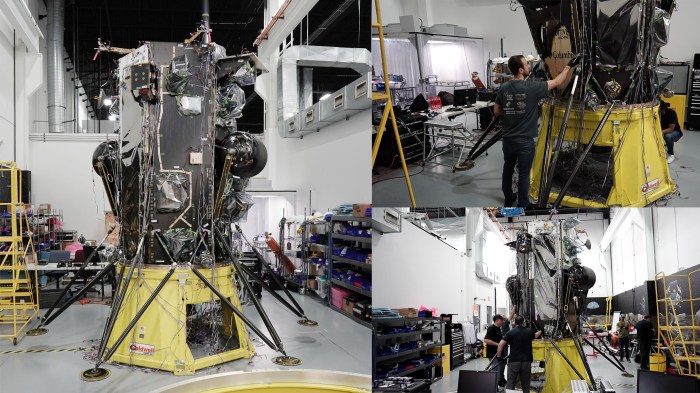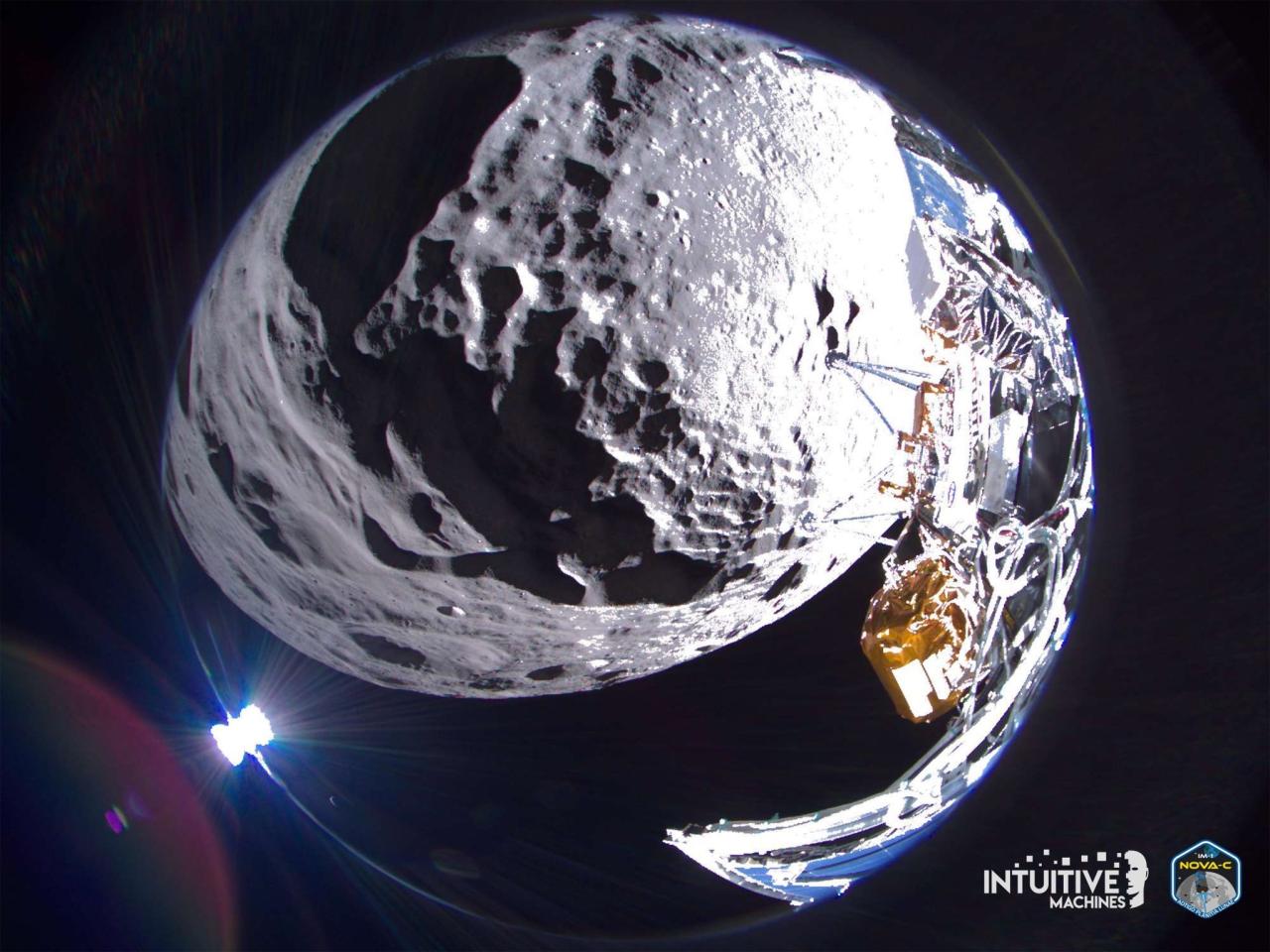Intuitive Machines Wants to Help NASA Return Samples from Mars: Get ready for a cosmic adventure! This ambitious mission aims to bring Martian soil back to Earth, and Intuitive Machines, a leading robotics and space exploration company, is playing a crucial role. Their expertise in robotic systems and landing technology will be key to retrieving these precious samples, providing scientists with invaluable insights into the Red Planet’s past and present.
Intuitive Machines’ involvement with NASA on this mission underscores their commitment to pushing the boundaries of space exploration. The company’s history is marked by innovation, having developed cutting-edge technologies that are revolutionizing our understanding of the cosmos. With their advanced robotic systems and landing capabilities, Intuitive Machines is uniquely positioned to help NASA achieve this groundbreaking scientific endeavor.
Intuitive Machines
Intuitive Machines is a private company that specializes in lunar and planetary robotic exploration. Founded in 2013, the company has established itself as a key player in the burgeoning commercial space industry, with a focus on providing cost-effective and innovative solutions for lunar missions.
Intuitive Machines’ mission is to enable access to space and make lunar exploration accessible to all. They strive to do this by developing reliable, reusable, and affordable robotic systems that can be deployed for scientific research, resource exploration, and commercial activities on the Moon.
Intuitive Machines’ Expertise in Robotics and Space Exploration
Intuitive Machines’ expertise lies in the development of advanced robotic systems designed for challenging environments like the lunar surface. Their core competencies include:
- Robotics and Automation: Intuitive Machines has developed sophisticated robotic systems for landing, traversing, and collecting data on the Moon. These robots are equipped with advanced sensors, navigation systems, and manipulation capabilities, enabling them to perform complex tasks in harsh environments.
- Spacecraft Design and Engineering: The company possesses extensive experience in designing and building spacecraft, including landing modules, rovers, and payloads. They leverage cutting-edge technologies to ensure the reliability and performance of their spacecraft.
- Software and Mission Control: Intuitive Machines has developed robust software systems for mission control, navigation, and data analysis. Their software solutions enable real-time monitoring and control of robotic missions, ensuring safe and efficient operations.
Current Projects and Collaborations
Intuitive Machines is actively involved in several ongoing projects and collaborations, including:
- NASA’s Commercial Lunar Payload Services (CLPS) Program: Intuitive Machines is a leading participant in NASA’s CLPS program, which aims to utilize commercial providers to deliver payloads to the lunar surface. The company has been awarded multiple contracts to deliver scientific instruments and technology demonstrations to the Moon.
- IM-1 Mission: In 2023, Intuitive Machines successfully launched its first lunar mission, IM-1, delivering NASA payloads to the Moon. This mission demonstrated the company’s capabilities in lunar landing and surface operations.
- IM-2 Mission: Intuitive Machines is currently developing its second lunar mission, IM-2, scheduled for launch in 2024. This mission will focus on delivering additional NASA payloads and conducting further scientific research on the Moon.
Intuitive Machines’ Technology and Mars Sample Return, Intuitive machines wants to help nasa return samples from mars
Intuitive Machines’ technology and expertise align perfectly with the challenges of Mars sample return. The company’s experience in:
- Precision Landing: Landing on Mars requires exceptional precision and accuracy, given the planet’s thin atmosphere and challenging terrain. Intuitive Machines’ expertise in lunar landing, honed through their CLPS missions, translates directly to the Mars environment.
- Robotic Sample Collection: The Mars sample return mission requires sophisticated robotic systems capable of collecting and storing samples for eventual return to Earth. Intuitive Machines’ experience in developing advanced robotic systems for lunar exploration, coupled with their expertise in navigation and manipulation, positions them well for this task.
- Data Transmission and Analysis: The Mars sample return mission will generate vast amounts of data, requiring robust communication and data processing capabilities. Intuitive Machines’ experience in mission control, data analysis, and software development will be critical for handling this data and ensuring the mission’s success.
Mars Sample Return: Intuitive Machines Wants To Help Nasa Return Samples From Mars
The Mars Sample Return (MSR) mission, a collaborative endeavor between NASA and international partners, aims to bring Martian samples back to Earth for in-depth scientific analysis. This ambitious mission holds the potential to revolutionize our understanding of the Red Planet, potentially revealing evidence of past life and unlocking secrets about its formation and evolution.
Scientific Goals and Objectives
The primary goal of the MSR mission is to collect Martian samples and return them to Earth for detailed scientific analysis. This analysis will address fundamental questions about the history of Mars, including:
- Did life ever exist on Mars?
- What is the composition of the Martian atmosphere and how has it changed over time?
- What are the geological processes that have shaped the Martian surface?
- What is the potential for future human exploration of Mars?
The MSR mission will contribute to a deeper understanding of the evolution of the solar system and the potential for life beyond Earth.
Proposed Timeline, Key Phases, and Potential Landing Sites
The MSR mission is expected to take place in multiple phases over a decade.
- Phase 1: Sample Collection (2028-2030): NASA’s Perseverance rover, currently exploring Mars, will collect and cache a variety of rock and soil samples in designated locations.
- Phase 2: Sample Retrieval (2031-2033): A robotic spacecraft will land on Mars, retrieve the cached samples, and launch them into Martian orbit.
- Phase 3: Sample Return to Earth (2033-2034): A separate spacecraft will rendezvous with the sample container in Martian orbit and bring it back to Earth for analysis.
The precise landing sites for the sample retrieval and return phases are still under consideration, but they are likely to be near the Jezero Crater, where Perseverance is currently operating.
Significance of Returning Martian Samples to Earth
Returning Martian samples to Earth for scientific analysis is crucial for several reasons.
- Enhanced Analysis: Earth-based laboratories offer unparalleled capabilities for studying Martian samples, allowing scientists to conduct a wide range of sophisticated analyses that are impossible to perform on Mars.
- Direct Observation: Analyzing Martian samples directly provides far more detailed information than can be obtained through remote sensing instruments, allowing for a much deeper understanding of the Red Planet’s history and composition.
- Future Exploration: The data obtained from Martian samples will be invaluable for planning future human missions to Mars, providing crucial insights into the potential hazards and resources that may be encountered.
The MSR mission represents a significant step forward in our exploration of Mars, potentially revealing groundbreaking discoveries that could transform our understanding of the universe and our place within it.
Impact and Future Implications
A successful Mars sample return mission would be a monumental achievement in space exploration, marking a significant step towards understanding the red planet’s history, potential for past or present life, and its role in the evolution of our solar system. The mission would also pave the way for future robotic and even human missions to Mars, opening up exciting possibilities for scientific discovery and technological advancement.
Scientific Discoveries from Martian Samples
Analyzing Martian samples returned to Earth could provide invaluable insights into the planet’s past and present, potentially answering some of the most fundamental questions about our place in the universe.
| Discovery Area | Potential Findings | Significance |
|---|---|---|
| Geochemistry and Mineralogy | Identifying minerals and chemical compositions of Martian rocks and soils, including evidence of past water activity and volcanic processes. | Understanding the evolution of Mars’ geological processes, including the potential for past habitability. |
| Organic Molecules and Biosignatures | Detecting organic molecules, potentially indicating past or present life, or remnants of ancient microbial ecosystems. | Providing evidence for the existence of life beyond Earth, potentially revolutionizing our understanding of life’s origins and distribution in the universe. |
| Atmospheric Composition and Climate History | Analyzing the composition of Martian atmosphere and identifying isotopes, providing insights into the planet’s climate history and its potential for supporting life. | Understanding the factors that led to the current state of Mars’ atmosphere and its potential for future habitability. |
| Isotopic Analysis | Studying the ratios of different isotopes in Martian rocks and atmosphere, providing clues about the origin and evolution of the planet. | Revealing the processes that shaped Mars’ formation and evolution, potentially providing insights into the early history of the solar system. |
The successful return of Martian samples would be a monumental achievement for science, providing unprecedented data that could revolutionize our understanding of the Red Planet and the potential for life beyond Earth. Intuitive Machines’ contribution to this mission highlights their commitment to advancing human knowledge and inspiring future generations of explorers. As we eagerly await the results of this incredible project, it’s clear that Intuitive Machines is at the forefront of the next era of space exploration, a future where robotic ingenuity and human curiosity will continue to unlock the mysteries of the universe.
Intuitive Machines is aiming to help NASA bring Martian samples back to Earth, a feat that would be a major step forward in our understanding of the Red Planet. Meanwhile, in the world of cybersecurity, Portswigger, the company behind the Burp Suite of security testing tools, has just secured a whopping $112 million in funding. This funding will allow Portswigger to continue developing its innovative security solutions, ensuring that our digital world remains safe from cyber threats.
The success of both Intuitive Machines and Portswigger highlights the importance of investing in both scientific exploration and technological advancements for a brighter future.
 Standi Techno News
Standi Techno News

